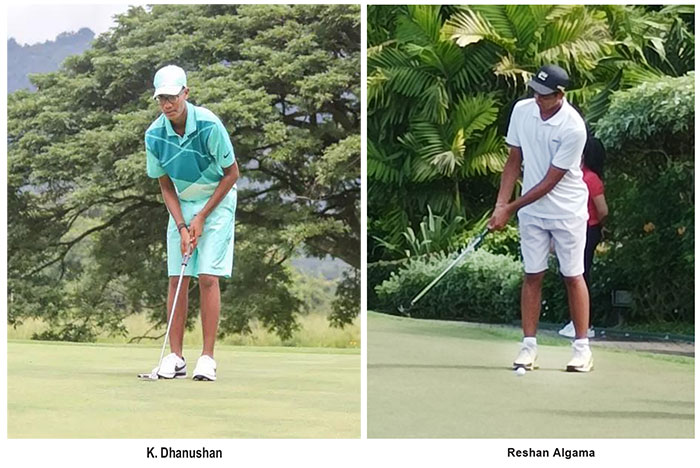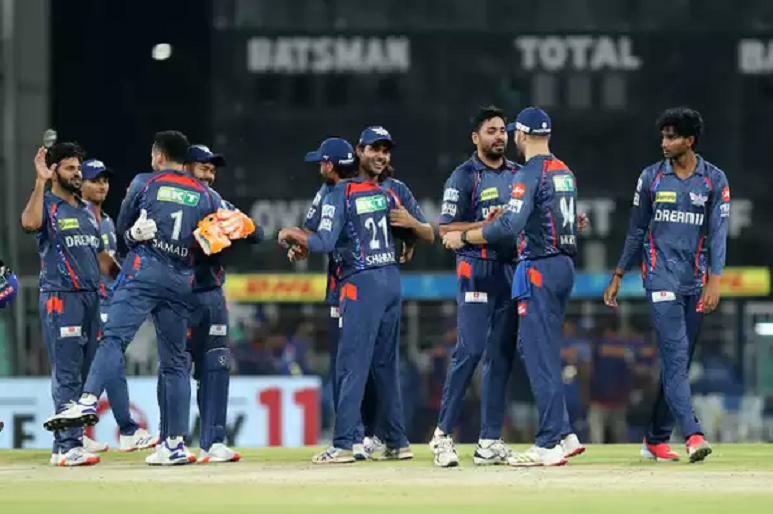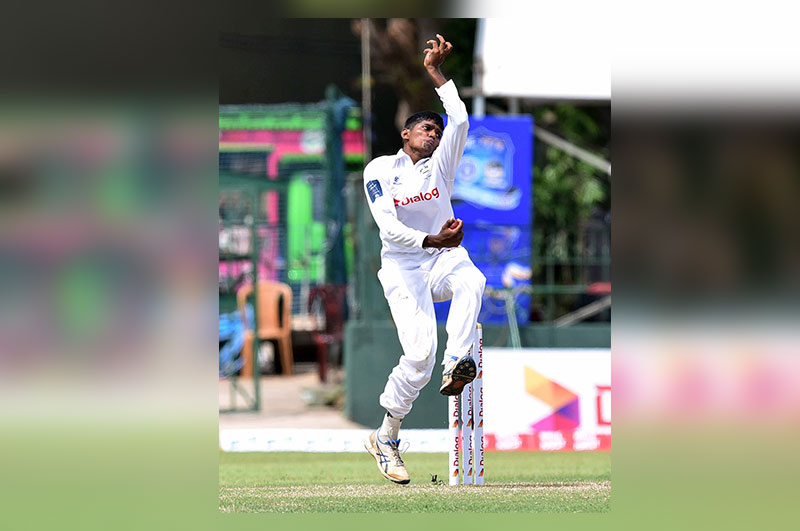Sports
Kaya Daluwatte and Reshan Algama shoot under par to lead girls gold and boys silver divisions

SRI LANKA JUNIOR OPEN GOLF CHAMPIONSHIP 2022
The Sri Lanka Junior Open Golf Championship 2022, Sponsored by PRIMA SUNRISE BREAD teed-Off at the RCGC with over 70 juniors playing in five different Age group Categories.
14 year old Kaya Daluwatte fired a fantastic one under par opening round to lead the Girls division by five strokes from Dhevinka Kanag-Iswaran who returned a solid 5 over par.
K. Dhanushan, last years Runner-up in the Boys Gold division grabbed the lead on day one with a 2 over par 73 five strokes clear of the defending champion Yannik Kumara and Nirekh Tejwani who shared the second spot on 78.
Reshan Algama fired a brilliant 3 under par 68 in the boys silver division to lead the field from Thejas Rathis Kanth in second place on 76, followed by H. D. Adithya Weerasinghe 77, the rising talent from Anuradhapura.
In the Bronze Division L.G. Anuja Methsara 89, took the lead from Kaitlyn Norton 90 followed by Aaradhi Samaratne 95.
Revaan Amarasinghe with a well compiled nine-hole score of 39 took a clear six stroke lead from Danik Daluwatte and Yuva Rathis Kanth jointly on 45, in the 09 & under age group Copper Division.
Mihneli Herat , Richard Magala, W.D.V.K. Schofield, Siyoon Lee, W. Dhyana Perera and Virulaka Abeywickrama made their Tournament debut starting their golfing career at a tender age. All debutants performed creditably including 17 juniors from Ananda College starting off their Golfing journey in the Prima Sunrise Bread Sri Lank Junior Open Golf Championship 2022.
Latest News
IPL 2025: Marsh, Markram and Rathi shine as LSG edge MI in thriller

Hardik Pandya claimed his maiden T20 five-fer and scored an unbeaten 16-ball 28 but was powerless to prevent Mumbai Indians’ [MI] third loss in four games. They lost to a spirited Lucknow Super Giants [LSG] side, who had Mitchell Marsh and Aiden Markram to thank for powering them to 203, a score that they defended by 12 runs, thanks in large part to a superb spell from 25-year-old Digvesh Rathi, who took 1 for 21.
At the 15-over mark, the contest was evenly poised: LSG stood at 146 for 3, MI at 143 for 3. Mumbai, historically strong chasers, seemed on course for a late surge. But that’s when Rathi made his mark. The legspinner delivered a crucial spell, conceding just 10 runs from his first three overs. Skipper Rishabh Pant even reserved an over of his for the death, and Rathi stood tall in the 18th, giving away just 11 against a rampaging Hardik Pandya. Across his four overs, Rathi bowled eight dots and conceded just a single boundary-proving to be the difference.
On the flip side, it was a night to forget for Impact Sub Tilak Varma. The rising star struggled to find fluency, scratching his way to 25 off 23 balls with just two boundaries. MI ultimately made the bold call to retire him out in the penultimate over, a move that underlined their desperate search for momentum.
LUCKNOW SUPER GIANTS
PowerPlay: Marsh takes charge
Phase Score: LSG 69/0 (RR: 11.50; 4s/6s: 10/2)
Mitchell Marsh could have been dismissed for just 4, and Trent Boult should’ve added yet another first-over wicket to his tally. But Mumbai Indians made a crucial blunder – they didn’t appeal for a clear nick. It proved costly. The Aussie powerhouse, fondly known as ‘The Bison’, tore into MI’s bowlers with brute force and clean timing. Marsh plundered nine boundaries and two towering sixes, driving straight and through the line with disdain even as the ball offered swing and the pitch served up uneven bounce.
He faced 30 deliveries in the PowerPlay – the most by any batter in that phase in IPL history – and made every ball count, hammering 60 runs off them in a whirlwind display.
Middle Overs: Markram holds firm even as MI chip away
Phase Score: LSG 77/3 (RR: 8.55, 4s/6s: 5/4)
Marsh fell to the very first ball he faced after the PowerPlay, chipping a return catch to Vignesh Puthur. The dismissal cracked open a window for Mumbai Indians to claw back, and skipper Hardik Pandya made the most of it. He struck with a sharp short ball to remove the dangerous Nicholas Pooran for just 12. Pandya wasn’t done yet. He extended Rishabh Pant’s lean start to IPL 2025, as the LSG captain mistimed a short ball that held up on the pitch, spooning a simple catch to mid-off. In the space of just 24 balls, LSG had lost three key wickets for 38 runs and were suddenly wobbling. That’s when Markram stepped in, steadying the innings with composure and control. He found an ideal partner in Ayush Badoni, and together they stitched a crucial 51-run stand off just 31 deliveries, dragging the LSG innings back on course
Death Overs: Hardik grabs maiden T20 five-fer but LSG breach 200
Phase Score: 57/5 (RR: 11.40; 4s/6s: 6/2)
Markram completed a 34-ball half-century but LSG’s push for late runs was pegged back by Pandya’s continued excellence. The MI skipper used his cutters into the wicket efficiently and forced LSG’s batters to hit to the longer boundaries. Three such deliveries accounted for Markram, David Miller and Akash Deep as Pandya completed his maiden T20 five-fer. Between those wickets, however, LSG still found useful runs, notably from the bat of Miller, who struck three fours and a six in his 14-ball 27 to power LSG to 203 – only the second 200+ score in Lucknow.
MUMBAI INDIANS
PowerPlay: Openers fall but Naman Dhir keeps MI on track
Phase Score: 64/2 (RR: 10.67; 4s/6s: 4/4)
Mumbai Indians lost both openers early, but Naman Dhir’s explosive cameo kept the chase alive. The returning Akash Deep made an immediate impact, removing Will Jacks in his first over as the Englishman mistimed a pull to deep square. Shardul Thakur then repeated the dose, dismissing Ryan Rickelton in identical fashion. Promoted to No.3, Dhir counterpunched in style. He tore into Deep in the fourth over, smashing 21 runs with two sixes and two fours – an over that flipped the PowerPlay back in MI’s favour. Suryakumar Yadav, easing his way in, added a six of his own as Mumbai raced to 64 for 2 after six overs, with Dhir blazing his way to 35 off just 15 balls.
Middle Overs: Suryakumar keeps MI in the hunt
Phase Score: 79/1 (RR: 8.78; 4s/6s: 11/0)
MI surged to 86 for 2 in just eight overs before Digvesh Rathi broke the momentum with a crucial breakthrough. His carrom ball snuck through Dhir’s defence, drawing a faint inside-edge that crashed into the stumps and ended the batter’s sparkling 24-ball 46. The 69-run third-wicket stand had laid a strong platform, but Rathi’s tidy spell began to apply the brakes. The young spinner was impressive, conceding just 10 runs in his first three overs. Tilak Varma, in particular, struggled to get going against him, battling to find rhythm. But Suryakumar Yadav kept the scoreboard ticking, finding regular boundaries to keep the chase alive. At the end of 13 overs, MI needed 79 from 42 balls-with the game finely poised. The India T20I captain got to a 31-ball half-century with a boundary off Ravi Bishnoi and another off Akash Deep to bring the equation to 61 off 30.
Death Overs: Shardul, Avesh hold nerve in tense finish
Phase Score: 48/2 (RR: 9.5, 4s/6s: 4/1)
LSG had a chance to break the partnership but Avesh Khan and Akash Deep fluffed an opportunity to effect a run-out. The former though atoned for that gaffe when he dismissed Suryakumar for 67 (42) after the batter walked across his crease to lap a ball but hit it too square and found the fielder at deep square-leg. That brought Pandya to the middle and the MI skipper drove the first ball – a full-toss – for four. But LSG continued to stack up good overs and Rathi bowled a very good 18th over before Shardul Thakur gave away just seven in the penultimate over when MI made the decision to pull Varma out. Avesh Khan was handed 22 runs to defend in the last over. He started on the back foot, conceding a six off the first ball, but held his nerve brilliantly thereafter. He nailed his yorkers under pressure, closing out a thrilling contest and sealing LSG’s second win of the season.
Brief scores:
Lucknow Super Giants 203/8 in 20 overs (Mitchell Marsh 60, Aiden Markram 53, Nicholas Pooran 12, Ayush Badoni 30, David Miller 27; Trent Boult 1-38, Ashwani Kumar 1-39, Vignesh Puthur 1-31, Hardik Pandya 5-36) beat Mumbai Indians 191/5 in 20 overs (Suryakumar Yadav 67, Naman Dhir 46, Ryan Rickelton 10, Tilak Vaema 25, Hardik Pandya 28*; Shardul Thakur 1-40, Akash Deep 1-46, Avesh Khan 1-40, Digvesh Rathi 1-21) by 12 runs
What’s next for the teams?
Mumbai Indians will return home to take on RCB on Monday (April 7). LSG will play the following day, against holders KKR in Kolkata.
Sports
Wakunugoda, Dewthusa guide Joes to safety

91st Battle of the Saints
Senuja Wakunugoda and experienced campaigner Yenula Dewthusa put on an unbroken 79 runs stand for the fourth wicket as St. Joseph’s reached 150 for three wickets at stumps in reply to St. Peter’s 243 runs on day two of the 91st Battle of the Saints big match at the SSC ground on Friday.
St. Joseph’s openers Abishek Jayaweera and Aveesha Samash got them off to a strong start as they added 59 runs for the first wicket. But Lashmika Perera had other ideas and took two quick wickets to trigger a mini collapse. The Joes were 71 for three wickets at one stage before Wakunugoda and Dewthusa combination guided them to safety.
Wakunugoda was unbeaten on 38 runs while Dewthusa was not out on 44 runs.
Earlier, Lashmika Perera made the Petes’ total look respectable by accelerating the run rate after his overnight partner Thareen Sanketh was beautifully bowled by Manasa Madubashana. Batting at number nine, Perera hit Nushan Perera for two consecutive fours and a six in one over and ended up as the highest scorer in the Petes’ first innings.
His knock of 58 runs included nine fours and a six.
Scores
St. Peter’s 176 for seven overnight 243 all out in 93.3 overs
(Dilana Damsara 44, Nathan David 29, Asadisa de Silva 38, Joshua Sebastian 27, Tharin Sanketh 21, Lashmika Perera 58; Manasa Madubashana 3/77, Yenula Dewthusa 2/58, Nusha Perera 2/50, Demion de Silva 2/48)
St. Joseph’s 150 for 3 wickets in 57 overs
(Abishek Jayaweera 23, Aveesha Samash 32, Senuja Wakunugoda 38n.o., Yenula Dewthusa 44n.o.; Lashmika Perera 2/31) (RF)
Latest News
IPL 2025: Venkatesh and Arora consign Sunrisers Hyderabad to their biggest-ever defeat

While Kolkata Knight Riders (KKR) regained the dazzling batting form they had lost somewhere on their trip to Mumbai, the Sunrisers Hyderabad (SRH) batting continued to be lackluster as they slumped to their third loss in a row after starting IPL 2025 with a mammoth 286. Four days after being skittled for 116 by Mumbai Indians, KKR posted a stiff 200 for 6, led by a 29-ball 60 from vice-captain Venkatesh Iyer and an unbeaten 17-ball 32 from Rinku Singh. Venkatesh and Rinku enabled KKR to finish with a bang – they scored 78 runs in their last five overs – after Ajinkya Rahane and Angkrish Raghuvanshi set things up with a third-wicket stand of 81.
SRH were punished for being sloppy in the field more than a few times, and managed just 120 in reply after the KKR quicks took their mighty top three down in just 13 balls. Last year’s runners-up slumped to the bottom of the table while the defending champions jumped five places from last to fifth.
Travis Head fell cheaply for the second time in a row against Vaibhay Arora as in the IPL final last year, while Abhishek Sharma and Ishan Kishan managed just 2 each. The eight runs scored by SRH’s top three was their second worst start in the IPL. In last year’s final, their top three – though Kishan wasn’t part of it – had managed just 11.
SRH barely recovered from 9 for 3 and slipped to 66 for 5 and eventually suffered their biggest defeat by a runs margin in the IPL.
There was no venom in the pitch, no unplayable bounce or movement either, but the SRH top order had no answers for the KKR pace attack, even though Mitchell Starc is no longer part of it. Head skied the second ball to mid-off, Abhishek edged a slower one from Harshit Rana in the second over to slip, and Kishan smashed one to cover where Rahane pouched a sharp catch on the tumble to delight the home fans. Nine for 3 could have become 9 for 4 had Andre Russell held on to an on-drive from Kamindu Mendis at mid-on and made it a double-wicket maiden for Arora. Russell, however, redeemed himself when he got the next wicket as soon as the powerplay ended, having Nitish Reddy caught at long-on. Arora picked up his third eventually, getting the big scalp of Henrich Klaasen for 33 when he returned for his second spell.
In between, Reddy showed glimpses of his ball-striking talent, Mendis heaved a couple of sixes on the leg side off Russell, and Klaasen tried to take the game deep even as the asking rate climbed past 15 an over. Rahane stifled SRH with five overs in a row from Sunil Narine and Varun Chakarvarthy, from the eighth to the 12th, which went for just 33 and brought two more wickets, before Arora removed Klaasen and Varun nearly scalped a hat-trick in the 16th over. SRH were eventually bowled out for 120, again raising question marks over their batting approach.
Even though the Eden pitch didn’t have the spice that was offered by the Wankhede’s in KKR’s last game, they lost their openers cheaply again. Narine fell to another yorker, edging one behind this time, for 7, and Quinton de Kock pulled a short ball to deep square leg for 1 off 6 as KKR crawled their way to 17 for 2 after three overs. They got a lift thanks to the Mumbai duo of Rahane and Raghuvanshi, who between them struck four sixes in 14 balls to help KKR end the powerplay on 53 for 2. Rahane smashed three of them, even before hitting his first four, peppering the leg-side boundary with two pulls and a majestic flick behind square.
Cummins brought on spin as soon as the field spread out and rookie legspinner Zeeshan Ansari rewarded his captain by stifling the set batters with turn, flight and different lengths to concede just 25 runs in three overs on the trot while the quicks continued to leak boundaries from the other end. Ansari conceded just one boundary off his first 14 deliveries, that too off a misfield from Reddy, before Raghuvanshi carted him for a six and four when he erred too full. Ansari, however, fought back with Rahane’s wicket for 38.
SRH could have had two in two had Reddy not put down Raghuvanshi at the rope on 43. Raghuvanshi made them pay with a cover drive for four later in the over and brought up his second IPL fifty in the next. His luck finally ran out against the ambidextrous Sri Lanka spinner Kamindu Mendis, and when Harshal Patel held onto an excellent catch that he dived for after running in from deep point.
KKR were going at just over eight an over after 13 overs, with two new batters in the middle. Harshal and Simranjeet Singh slowed them down further by taking the pace off the ball, but the trick didn’t work for too long. Rinku and Venkatesh took off once they got their eyes in and powered KKR to their first 200 total of this campaign. Rinku started the carnage with three consecutive fours off Harshal in the 17th while Venkatesh reeled off two in the next over, which Rinku finished with a towering six over long-on. Venkatesh then turned his purr into a roar in the penultimate over. Even though Cummins tried his cutter, a slower bouncer and a yorker among other things, Venkatesh went 4, 6, 4, 4 and brought up a 25-ball fifty before blasting Harshal for a six and a four at the start of the final over. He holed out next ball, and Harshal conceded just three off the last three, but the damage had already been done.
Brief scores:
Kolkata Knight Riders 200 for 6 in 20 overs (Venkatesh Iyer 60, Angkrish Raghuvanshi 50, Ajinkya Rahane 38, Rinku Singh 32*; Mohammed Shami 1-29, Pat Cummins 1-44, Zeeshan Ansari 1-25, Harshal Ptel 1-43, Kamindu Mendis 1-04) beat Sunrisers Hyderabad 120 in 16.4 overs (Nitish Kumar Reddy 19, Kamindu Mendis 27, Heinrich Klaasen 33,Pat Cummins 14; Vaibhav Arora 3-29, Varun Chakravarthy 3-22, Harshit Rana 1-15,Andre Russel 2-21, Sunil Narine 1-30 ) by 80 runs
[Cricinfo]
-

 Business1 day ago
Business1 day agoStrengthening SDG integration into provincial planning and development process
-

 News5 days ago
News5 days agoBid to include genocide allegation against Sri Lanka in Canada’s school curriculum thwarted
-

 Sports6 days ago
Sports6 days agoSri Lanka’s eternal search for the elusive all-rounder
-

 Sports2 days ago
Sports2 days agoTo play or not to play is Richmond’s decision
-

 News6 days ago
News6 days agoComBank crowned Global Finance Best SME Bank in Sri Lanka for 3rd successive year
-

 Features6 days ago
Features6 days agoSanctions by The Unpunished
-

 Features6 days ago
Features6 days agoMore parliamentary giants I was privileged to know
-

 Latest News4 days ago
Latest News4 days agoIPL 2025: Rookies Ashwani and Rickelton lead Mumbai Indians to first win













